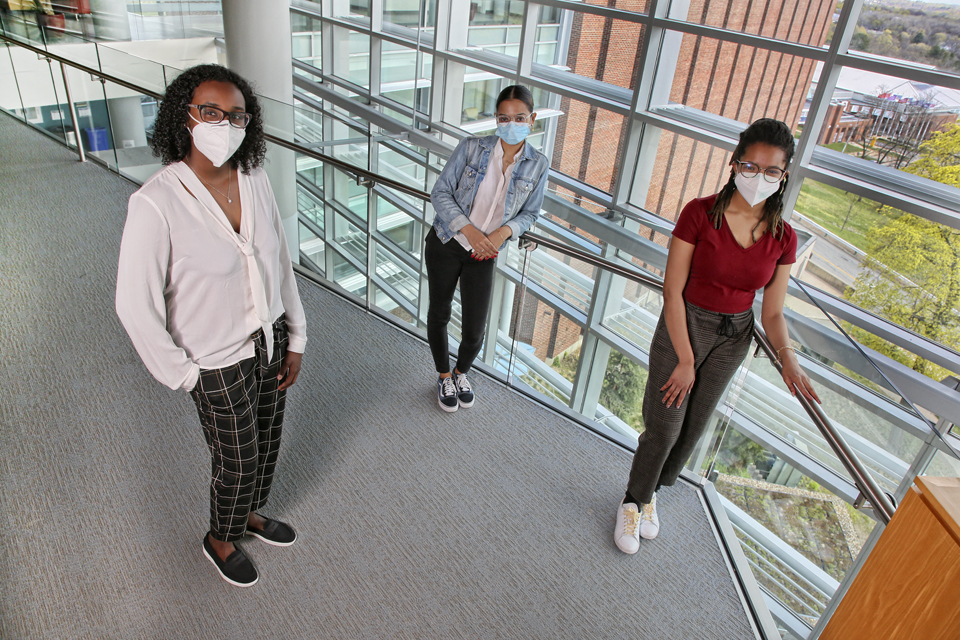Building the next generation of health care professionals
The Minority Association for Pre-Medical Students aims to increase the number of underrepresented groups in health care.
 Mike Lovett
Mike LovettFrom left to right: Ahmed, Diaz-Rodriguez and Brathwaite.
For a few months last spring, it seemed like the Minority Association for Pre-Medical Students (MAPS) was about to become a casualty of the pandemic.
Its members, mostly seniors, were juggling applying to graduate school, taking classes remotely and trying to get enough members to attend meetings via Zoom.
But Mariuxi Diaz-Rodriguez ’22, Ariel Brathwaite ’22 and Salma Ahmed ’22 decided MAPS was too important to let disappear. They volunteered to become the club’s new leaders and devised a plan to reinvigorate the club and promote it to the Brandeis community.
“In my first year at Brandeis, I would leave my classes stressed,” said Diaz-Rodriguez. “I’d think to myself ‘Okay, let me go to the MAPS meeting.’ Everybody there would be supportive and encouraging which was really important for me to get through that period.”
“I want to provide that support system for other people as well,” she said.
MAPS is a part of the Student National Medical Association, with chapters at universities and colleges across the country. The Brandeis group was founded in 2017 by Myles Porter ’20 and Samia Tamazi ’20 to support and provide mentorship to members of underserved communities pursuing careers in the medical field.
Despite its official name, the group also welcomes students interested in careers in health care and public health such as physician assistants and nurses.
At its biweekly meetings, which this year were held via Zoom, Diaz-Rodriguez, Brathwaite, and Ahmed, put on presentations on diversity and inclusion in health care, networking and the graduate school application process.
According to the Association of American Medical Colleges, students of color enroll in medical school at much lower rates than white students. It was even found that more Black men applied to medical school in 1978 than in 2014.
Research also shows that students of color are more likely to go into healthcare when they see other people of color in these positions.
With this in mind, MAPS recently hosted a career panel that featured graduate students of color in podiatry, physician assistants, nursing and medicine. Panelists’ presentations were followed by an discussion between panelists and MAPS’ members.
“We wanted to show our members that there are different pathways in medicine and that there are also people that look like us on those pathways,” said co-president Brathwaite. “It boosts people's self-esteem and gives them an opportunity to expand their network.”
“Exposing them to graduate students was really important because it shows them that their goals are achievable,” she added.
Brathwaite and the other board members are looking forward to growing MAPS’ membership and increasing the services it offers. They have plans for career advancement workshops, partnerships with the Hiatt Career Center and having old club members mentor new ones.
Diaz-Rodriguez’s mentor became a vital part of her support system at Brandeis. She taught her how to find academic opportunities outside of class, helped her adjust to life on campus, and eventually became her friend.
“I felt so fortunate to have been able to get a mentor who was a Brandeis student with a major similar to mine,” Diaz-Rodriguez said. “I still speak to her to this day.”
It was their mentorship relationships and the sense of community among MAPS members that inspired Diaz-Rodriguez, Brathwaite and Ahmed to assume leadership roles in the club.
“Mariuxi, Salma and I have always talked about what MAPS could be, what it should be, and what it can be under us. Maybe we always subconsciously knew that we'd be the ones to revive it,” said Brathwaite.
Categories: Student Life





